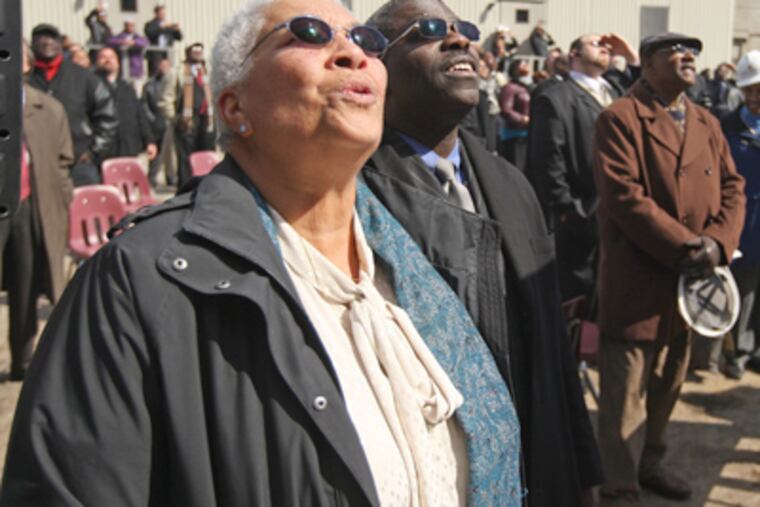Exiting Richman takes stock of PHA
Estelle Richman's time is up in Philadelphia. Seven months ago, she became the one-woman board of the Philadelphia Housing Authority (PHA). But her employer - the U.S. Department of Housing and Urban Development (HUD) - has given her a new assignment.

Estelle Richman's time is up in Philadelphia.
Seven months ago, she became the one-woman board of the Philadelphia Housing Authority (PHA). But her employer - the U.S. Department of Housing and Urban Development (HUD) - has given her a new assignment.
Richman, a former Philadelphia managing director and member of the Rendell cabinet in Harrisburg, is now the acting deputy secretary of HUD. She has turned over her PHA board duties to a colleague, Karen Newton-Cole, HUD's head of human resources.
Richman joined PHA on March 4 after HUD pressured the former five commissioners to resign following the firing of former Executive Director Carl R. Greene.
Criticized by some employees for creating a culture of fear at PHA, Greene was the target of four sexual-harassment complaints that were eventually settled for more than $1 million.
Richman talked via phone from HUD headquarters with Inquirer reporters Jennifer Lin and Mark Fazlollah about the current situation at PHA.
Question: Compare what it's like at PHA today vs. when you first arrived.
Estelle Richman: When I first got there, particularly with the staff, you could feel the tenseness and anxiety in the room. I don't think people knew if their jobs were safe . . . or if the previous executive director might reappear.
Our goal is not to do harm, to stabilize the agency, to look at where the problems are, and to make sure there was a CEO there who had solid values and proven integrity, who knew how to do this kind of leadership turnaround.
Q: Did you have to convince Michael P. Kelly [former general manager of the New York City Housing Authority and now PHA's executive director] to take the job full-time?
Richman: A little bit.
In the beginning, too, he had a lot of concerns.
The first few weeks, Mike and I talked a lot every day. I began to feel very comfortable with him. We found a good link and I approached Mike after about three months and asked him, "Are you interested?"
Q: Are the issues PHA is facing greater or lesser than what you first thought?
Richman: They're different.
The issues now are more operational and making sure all the pieces are in place for a smoother future.
[PHA recently hired a new general counsel, Barbara Adams. The agency previously relied on outside attorneys for much of its legal work, spending $38 million from 2007 to 2010.]
Barbara is moving pretty quickly. The commitment is . . . to build an internal force and not to rely on outside counsel as the sole group for the lifeblood of legal issues ever again, where everything you do has to go through outside counsel.
The other piece that's changed is, we've begun to build senior staff. Kelvin Jeremiah [former inspector general of the New York City Housing Authority and now PHA's director of audits and compliance] is a clear investment in the future.
. . . The final step is what to do about the board.
[Bills are pending in the Pennsylvania General Assembly to give the mayor of Philadelphia the authority to appoint a larger board of seven.]
Our position is that every other city in the commonwealth has a mayor-appointed board. Why should Philadelphia be different?
Q: When you arrived, was there anything that shocked you about the agency?
Richman: I'm not sure I knew how little information was being shared with the public - for example, the budget. I was absolutely startled that people within the agency had never seen the budget.
I knew Carl held things close, but it had never occurred to me that he had never shared in open meeting things like audits and budgets and contracts.
Q: What has HUD learned from this experience?
Richman: It is great to have wonderful outcomes. But at the same time, how you treat staff and share information, how you administratively run your agency, are just as important.
When you look at the development that happened in Philadelphia, you have to say, some of this is very good.
But if you told me it was good stuff and produced legal fees that were out of line or the staff was complaining about abuse - you don't trade one for the other.
To some degree we were all taken in by the outcomes without taking into consideration the cost - the human cost.
Q: Philadelphia is one of nine housing authorities in receivership. How is this situation different?
Richman: Some of those receiverships are due to financial difficulty within the agency. They have commitments and can't meet their bills.
That was not the case here.
This was more of an administrative leadership issue than a financial issues.
Q: According to the agreement that was signed last March, HUD would control PHA for a year and then consider whether it had "recovered" enough to return to local control.
Richman: It's on track. There are still some pieces of the recovery plan that Mike is working on. We want to see a trained and educated board before we would turn it over.